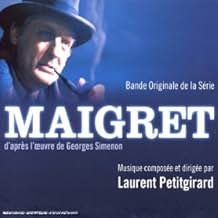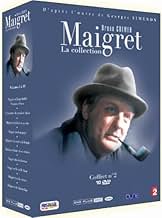Maigret
- Série télévisée
- 1991–2005
- Tous publics
- 1h 30min
NOTE IMDb
8,0/10
865
MA NOTE
Maigret, pragmatique, réservé et raffiné, enquête sur des meurtres de manière singulière et sans précipitation et découvre inévitablement la vérité.Maigret, pragmatique, réservé et raffiné, enquête sur des meurtres de manière singulière et sans précipitation et découvre inévitablement la vérité.Maigret, pragmatique, réservé et raffiné, enquête sur des meurtres de manière singulière et sans précipitation et découvre inévitablement la vérité.
- Récompenses
- 1 victoire au total
Parcourir les épisodes
Histoire
Commentaire à la une
The Bruno Cremer "Maigret" series is exceptional and reminds me of those great British books-to-television mystery series from the 80s/90s such as Jeremy Brett's Sherlock Holmes, David Suchet's Hercule Poirot, and (my favorite) John Thaw's Inspector Morse. What I enjoy most about the Cremer series is how well it captures the atmosphere-bars, bistros, apartments, mansions, the wet pavement of the streets, peripheral noises, the varied dialogue, and the quiet moments--that the author George Simenon brings to his books (both his "Maigret" titles and his other novels--I've read all the Maigret stories and several of his other titles). One doesn't read Simenon's Maigret mysteries simply for setup, epiphanous moment, and denouement. I would say the same is true of watching this series. Getting to and finding out "Who did it?" matters, yes, but only a bit. The best parts are the lingering moments in between.
One wise decision made in developing this Maigret series is that all episodes are set in the late 40s through the 50s. Simenon's Maigret novels span across several decades (30s - early 70s) and the change in ages, fashions, cars, and architecture would have been a challenge. And of course, there would have been the war years and the German occupation of Paris. While not actually shot in Paris, who cares? This is the Paris of the late 40s and early 50s, maybe not in reality but the Paris of our-at least, my-imagination, the Paris that Simenon paints in his stories. Capturing that look and feel is crucial if one is to film Simenon. I applaud the filmmakers.
Generally, these episodes adhere to their corresponding novel. Not always and seldom perfectly. I don't mind an addition or embellishment here or there. It's the nature of book-to-film, but if one does it then one better do it well. In this series, it's usually, but not always, done quite well. Bruno Cremer embodies Maigret and delivers, for me, the character I imagined when reading the novels. I'm grateful for the 54 episodes in this series. I wish there were more. (There are over 100 Maigret stories counting both novels and short stories.)
BY THE WAY, In Simenon's Maigret stories, Maigret's assistants change with some being given more prominence than others in different books. Those assistants include Lucas, LaPointe, Torrence, Dufour, and Janvier, among others. The filmmakers sometimes condense these characters into maybe one or two where in the book there are two or three or more. It seldom, if ever, affects the story or plot. While true that Lucas appears more in the novels than in this series he is NOT in every novel as Maigret's right hand man (as one reviewer persists in claiming).
My review here and of individual episodes are based on the DVD set.
One wise decision made in developing this Maigret series is that all episodes are set in the late 40s through the 50s. Simenon's Maigret novels span across several decades (30s - early 70s) and the change in ages, fashions, cars, and architecture would have been a challenge. And of course, there would have been the war years and the German occupation of Paris. While not actually shot in Paris, who cares? This is the Paris of the late 40s and early 50s, maybe not in reality but the Paris of our-at least, my-imagination, the Paris that Simenon paints in his stories. Capturing that look and feel is crucial if one is to film Simenon. I applaud the filmmakers.
Generally, these episodes adhere to their corresponding novel. Not always and seldom perfectly. I don't mind an addition or embellishment here or there. It's the nature of book-to-film, but if one does it then one better do it well. In this series, it's usually, but not always, done quite well. Bruno Cremer embodies Maigret and delivers, for me, the character I imagined when reading the novels. I'm grateful for the 54 episodes in this series. I wish there were more. (There are over 100 Maigret stories counting both novels and short stories.)
BY THE WAY, In Simenon's Maigret stories, Maigret's assistants change with some being given more prominence than others in different books. Those assistants include Lucas, LaPointe, Torrence, Dufour, and Janvier, among others. The filmmakers sometimes condense these characters into maybe one or two where in the book there are two or three or more. It seldom, if ever, affects the story or plot. While true that Lucas appears more in the novels than in this series he is NOT in every novel as Maigret's right hand man (as one reviewer persists in claiming).
My review here and of individual episodes are based on the DVD set.
- garywhalen
- 8 sept. 2023
- Permalien
Meilleurs choix
Connectez-vous pour évaluer et suivre la liste de favoris afin de recevoir des recommandations personnalisées
Détails
Contribuer à cette page
Suggérer une modification ou ajouter du contenu manquant






























